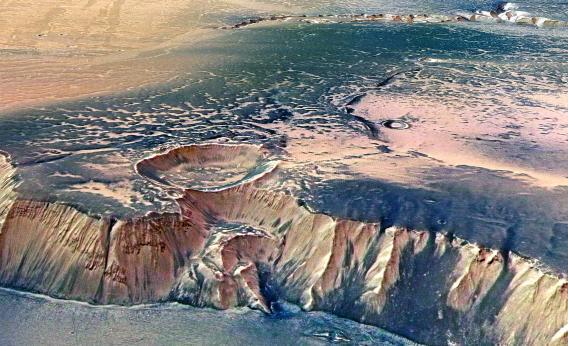Space: reality TV’s final frontier.
The Dutch startup Mars One is counting on reality television to fund a highly ambitious trip to colonize the red planet.
The company hopes to establish the first human colony on Mars in 2023. (That’s 10 years before NASA hopes to reach Mars.) It plans to send four explorers on a one-way trip, with new teams following every two years.
That’s right—the Mars One colonists should expect to remain there for the rest of their lives, though the project website notes, “this is no way excludes the possibility of a return flight at some point in the future.” The settlers will have to hope that once Mars is sufficiently populated and developed, it will be “much easier to build the returning rocket there.” How comforting.
Still, even with the simplified logistics of a one-way trip, the Mars One project will still carry a hefty price tag—an estimated $6 billion for the initial four astronauts. To raise the cash, Mars One co-founder Bas Lansdorp plans on “creating the biggest media event ever.”
“To attract sponsors, we will create appealing media content around the selection of the astronauts, the training, unmanned missions and other topics,” said Lansdorp in an interview with Gizmag. “This should convince sponsors and investors to participate with the promise of an even bigger exposure later: we expect that almost every person on Earth will witness the landing of the first astronauts on Mars.”
Lansdorp imagines that the reality show would continue long after the buzz surrounding the initial launch has subsided, as “many people will tune in a couple of times per week to see how ‘our people on Mars’ are doing.”
Naturally, one of the project’s sponsors is Paul Römer, the co-creator of the groundbreaking reality TV show Big Brother. Other Mars One “ambassadors” include Noble Prize-winning physicist Dr. Gerard ‘t Hooft, and Gerard Blaauw, chairman of the Netherlands Space Society.
The colonist selection process, which smacks of reality TV, begins in 2012 with what is essentially an open casting call. Eventually, 40 people will take part in a rigid, decade-long training program, to be narrowed down to the final four. The selection and training process will be broadcast via television and online to public, with viewers voting on the final selected four
Warning to those would-be spacefarers: We’ve seen enough reality TV to know that they always cast a villain, so watch the air supply on your suit.
